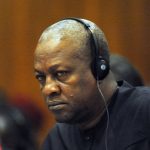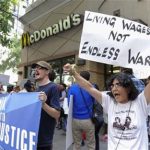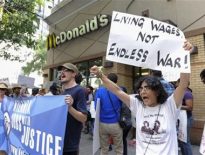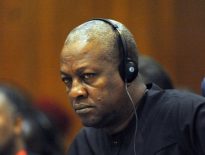BAGHDAD (AP) — Hundreds of demonstrators took to the streets of Iraqi cities on Saturday to protest lawmakers’ perks despite an intense security crackdown, and gunmen in the capital stormed a Sunni mosque and killed five at dawn in the latest bout of sectarian unrest rocking the country.
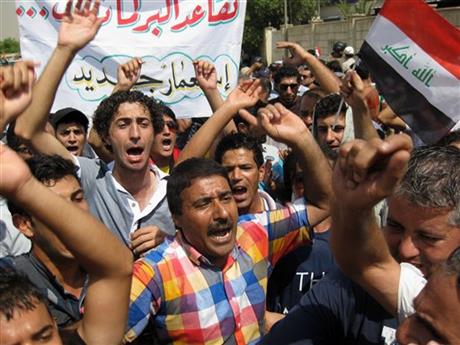
Protest organizers demanded an end to what they claim are generous pension benefits granted to members of parliament, and demonstrators aired long-standing grievances about widespread corruption and the poor state of public services.
Iraqi lawmakers are entitled to monthly pension payments of several thousand dollars per month regardless of how long they serve— far more than the amounts government employees and private sector workers typically get after decades of work. Many Iraqis suspect the country’s 325 lawmakers in Parliament are in politics only for the money, and they accuse them of being ineffective and slow to address the country’s myriad problems.
“We want to tell the officials that they should stop stealing. Enough is enough!” said demonstrator Ammar Abdul-Aziz, a 35-year-old engineer in Baghdad.
Authorities did not grant permission for the demonstrations in the capital, drawing criticism from rights groups Amnesty International and Human Rights Watch. Security forces blocked bridges and deployed large numbers of rifle-toting soldiers and police in major squares — an extraordinary show of force that protesters said was mainly taken to prevent demonstrators from congregating in larger numbers.
Interior Ministry spokesman Saad Maan Ibrahim defended the security operation, saying authorities were concerned suicide bombers might try to attack the rallies. He insisted authorities had no problem with the demonstrations and that his forces were present only to protect protesters.
If someone tried to kill protesters with a “bomb, all the people will say ‘why didn’t you protect us?'” he told The Associated Press at a Baghdad square protest site. Security forces backed by Humvees and armored personnel carriers there outnumbered the flag-waving protesters, who were surrounded by police preventing journalists from getting near them.
One of the Baghdad protest organizers, Mohammed Abbas, said he was beaten by security forces as he and his colleagues were trying to reach the central Tahrir Square. He declared the day’s protests a success despite the low turnout and pledged to mount more demonstrations.
Outside the capital, hundreds of people demonstrated in the southern city of Basra, where one banner declared: “The resources of Iraq are for Iraqis, not the lawmakers.”
Protests were also reported in Nasiriyah and Hillah, also in the country’s mainly Shiite south.
Prime Minister Nouri al-Maliki issued a statement on his website voicing “support for the protesters’ demands” and said he would work to reform lawmakers’ compensation.
Iraqi authorities cracked down firmly against anti-government protests the erupted at the start of the Arab Spring in early 2011. A new wave of ongoing protests erupted in Sunni Muslim areas in December, the most serious political challenge to the Shiite-led government since U.S. troops left in late 2011.
Hours before Saturday’s protests, gunmen using weapons fitted with silencers stormed a Sunni mosque in the capital’s southeastern New Baghdad neighborhood and shot at Sunni worshippers praying at dawn, police said. Five worshippers were killed and two were wounded, medical officials at a nearby hospital said. The police and medical officials spoke on condition of anonymity because they were not authorized to talk to the media.
Most attacks on civilians in recent years have been the work of Sunni extremist groups such as al-Qaida. But attacks on Sunni mosques have been on the rise in recent months, raising fears that Shiite armed groups are starting to retaliate.
Violence in Iraq has intensified since April to levels not seen since 2008. More than 4,000 people have been killed over the past five months alone, including more than 590 in August.
___
Associated Press writer Sameer N. Yacoub contributed reporting.
___
Follow Adam Schreck on Twitter at www.twitter.com/adamschreck


